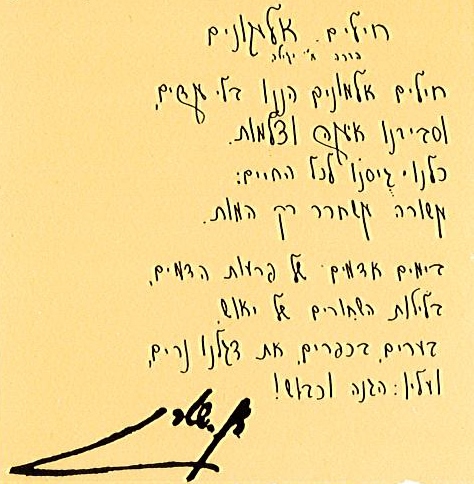 Avraham (Yair) Stern, the founder of the militant Zionist group Lehi, is a fascinating personality whose papers are kept at the CZA. Stern was born in Poland in 1907. His childhood was not easy. During the Bolshevik Revolution he was forced to live with his mother and brother far away from his father and his home. Despite the difficulties, he stood out at school for his wisdom, his talent for languages and his writing abilities. When he grew up, his parents sent him to study in Palestine at the Herzliya Hebrew Gymnasium and the Hebrew University. He financed his studies by giving private lessons and by receiving excellence scholarships. During his studies he joined the Haganah. The 1929 riots in Palestine made him think that the Jews had to start fighting the British. Therefore, when Avraham Tehomi quit the Haganah and founded the Etzel, Stern joined him. At that time, Stern wrote the song "Unknown Soldiers" that was adopted by the Etzel as their anthem.
Avraham (Yair) Stern, the founder of the militant Zionist group Lehi, is a fascinating personality whose papers are kept at the CZA. Stern was born in Poland in 1907. His childhood was not easy. During the Bolshevik Revolution he was forced to live with his mother and brother far away from his father and his home. Despite the difficulties, he stood out at school for his wisdom, his talent for languages and his writing abilities. When he grew up, his parents sent him to study in Palestine at the Herzliya Hebrew Gymnasium and the Hebrew University. He financed his studies by giving private lessons and by receiving excellence scholarships. During his studies he joined the Haganah. The 1929 riots in Palestine made him think that the Jews had to start fighting the British. Therefore, when Avraham Tehomi quit the Haganah and founded the Etzel, Stern joined him. At that time, Stern wrote the song "Unknown Soldiers" that was adopted by the Etzel as their anthem.
Avraham Stern left for Florence to carry out his doctorate studies in classical languages. His teachers claimed that he would be very successful in academic research, but life continued on a different path. Avraham Tehomi came to Florence to ask Stern to purchase weapons and smuggle them to Palestine. Stern abandoned his studies and focused entirely on matters of the Underground. He was sent to participate in operations in Europe and Poland, and tried to convince the Jews there to join the Underground. In 1936 he married Roni Bornstein.
 The outbreak of World War II, led the leaders of the Etzel to change their policy. They decided not to fight the British as long as they were both fighting a common enemy – the Nazis. Stern rejected collaboration with the British and therefore founded the Lehi. This movement continued to struggle against the British. Stern outlined the ideological and political principals of the resistance in his essay "Eighteen Principals of Rebirth".
The outbreak of World War II, led the leaders of the Etzel to change their policy. They decided not to fight the British as long as they were both fighting a common enemy – the Nazis. Stern rejected collaboration with the British and therefore founded the Lehi. This movement continued to struggle against the British. Stern outlined the ideological and political principals of the resistance in his essay "Eighteen Principals of Rebirth".
The Lehi was a small group with only a few hundred members and limited financial resources. The group was persecuted by the British and by the people of the Yishuv as they resented the operations against the British, during the time of the Second World War. There were also operations that caused injuries to Jews. The British published pictures of Stern and other Lehi members, in the Jewish newspapers with a promise to reward those who would help to catch them. Stern was forced to hide and move from place to place in Tel Aviv. The British Police finally traced him on February 12th, 1942, hiding in a closet at the house of Moshe and Tova Svorai. He was shot by police detectives and was buried at the Nahalat Yitzhak cemetery.
During the years of struggle with the British, Avraham Stern had written poems whenever he had the chance. Even in his last days, while hiding from the British, he worked on his poems and after his death, several books of his poems were published.